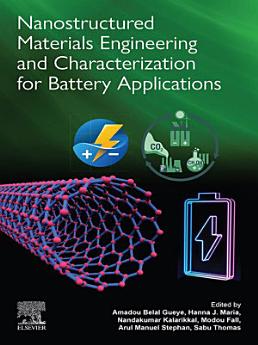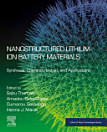Nanostructured Materials Engineering and Characterization for Battery Applications
About this ebook
About the author
Amadou Belal Gueye is a Research Scholar at the School of Chemical Sciences, Mahatma Gandhi University, Kottayam, India. He received his bachelor’s degree in physics-chemistry and his master’s degree in physical chemistry applied to energy and analysis, from Cheikh Anta Diop University, Dakar, Senegal. He works in the field of lithium/sulfur batteries.
Hanna J. Maria is a Senior Researcher at the School of Energy Materials and the International and Inter University Centre for Nanoscience and Nanotechnology, Mahatma Gandhi University, India. Her research focusses on natural rubber composites and their blends, thermoplastic composites, lignin, nanocellulose, bionanocomposites, nanocellulose, rubber-based composites and nanocomposites.
Dr. Nandakumar Kalarikkal is an Associate Professor at the School of Pure and Applied Physics and Joint Director of the International and Inter University Centre for Nanoscience and Nanotechnology of Mahatma Gandhi University, Kottayam, Kerala, India. His research activities involve applications of nanostructured materials, laser plasma, and phase transitions. He is the recipient of research fellowships and associateships from prestigious government organizations such as the Department of Science and Technology and Council of Scientific and Industrial Research of the Government of India. He has active collaborations with national and international scientific institutions in India, South Africa, Slovenia, Canada, France, Germany, Malaysia, Australia, and the United States. He has more than 130 publications in peer-reviewed journals. He also co-edited nine books of scientific interest and co-authored many book chapters.
Prof. Modou Fall is the Secretary General of the Senegalese Committee for Chemistry, Full Professor in the Department of Chemistry, Sciences and technologies Faculty, Cheikh Anta DIOP University of Dakar, Senegal.His main research interests include the synthesis, characterization and applications of conducting polymers, energy storage and conversion, corrosion studies and electroanalysis of hazardous compounds. He is the co-author of "General Physical Chemistry - Courses and exercises L1.
Dr. Arul Manuel Stephan is a Senior Principal Scientist of Central Electrochemical Research Institute (CSIR- CECRI), Karaikudi, India. His area of interest focuses on advanced materials for lithium-ion and lithium sulfur batteries. He was associated with Prof. Yuri Saito at Osaka National Research Institute, Osaka, Japan under Japan Science and Technology Agency (JSPS) fellowship. Subsequently he was involved in the development of porous membranes for lithium-ion batteries at the Department of Chemistry, The University of Tulsa. He was the recipient of the most cited article award from European Polymer Journal and Best Paper Award from "Energy Storage Materials" in 2017. He has more than 110 publications.
Sabu Thomas is the chairman at the Trivandrum Engineering Science and Technology Research Park (TrEST Research Park) and the former vice chancellor at the Mahatma Gandhi University, Kottayam, Kerala, India. He is also the director at the School of Energy Materials, the School of Nanoscience and Nanotechnology, and the International and Inter University Centre for Nanoscience and Nanotechnology. Prof. Thomas is also the former director at the School of Chemical Sciences and the founder of the School of Polymer Science and Technology, Mahatma Gandhi University, Kottayam, Kerala, India. He received his Ph. D. in 1987 in Polymer Engineering from the Indian Institute of Technology (IIT), Kharagpur, India. He has been ranked no.1 in India about the number of publications (most productive scientists). Prof. Thomas’s research group specialized areas of polymers which includes Polymer blends, Fiber filled polymer composites, Particulate-filled polymer composites and their morphological characterization, Ageing and degradation, Pervaporation phenomena, sorption and diffusion, Interpenetrating polymer systems, Recyclability and reuse of waste plastics and rubbers, Elastomer cross-linking, Dual porous nanocomposite scaffolds for tissue engineering, etc. Prof. Thomas’s research group has extensive exchange programs with different industries, research, and academic institutions all over the world and is performing world-class collaborative research in various fields. Professors Centre is equipped with various sophisticated instruments and has established state-of-the-art experimental facilities which cater to the needs of researchers within the country and abroad. His H Index- 133, Google Citations- 86424, Number of Publications- 1300, and Books-160.






